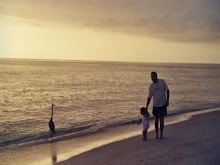 mother and sister and my father would join us for 4 weeks. I love l'Alt Empordà. I always enjoyed my time there, I made great friends, I enjoyed the beach, I started to learn about the Catalan culture and values (something that was totally absent where I lived the first part of my childhood, L'Hospitalet de Llobregat), I improved my Catalan and even though my Alt Empordà accent is long gone (turned into the ugly Barcelonian accent), I still remember phrases and expressions I loved ("Poc que ho sabia jo" - I have no clue), I still use the "pas" to negate (Això no m'agrada pas), I often do the past participle accord ("No les he vistes") and have a weakness for the Gallicisms ("carrotes i tomates").
mother and sister and my father would join us for 4 weeks. I love l'Alt Empordà. I always enjoyed my time there, I made great friends, I enjoyed the beach, I started to learn about the Catalan culture and values (something that was totally absent where I lived the first part of my childhood, L'Hospitalet de Llobregat), I improved my Catalan and even though my Alt Empordà accent is long gone (turned into the ugly Barcelonian accent), I still remember phrases and expressions I loved ("Poc que ho sabia jo" - I have no clue), I still use the "pas" to negate (Això no m'agrada pas), I often do the past participle accord ("No les he vistes") and have a weakness for the Gallicisms ("carrotes i tomates").In Costa Brava, I also improved my English as a teenager, I learnt basic French and decided that Catalonia and Spain were far to small for me to stay.
My chidren's life is totally different. My wife works and only has two weeks vacation a year (very normal for those who have worked in an American company for less than 5 years) and even though I have more vacation days, I do not like to go alone with the kids, when my wife is working, although I do it some times.

On the flip side, my kids are also used to going somewhere "exotic" for winter vacation. Last year we went to Bahamas, this year to Aruba. We went to this resort called Divi Aruba, a very nice place, beautiful beach, great facilities, quiet and relaxing. I needed this week of relax with my family. Since I took my new job in October, I have traveled every week, Europe, China, India, Brazil, Mexico, etc. I needed one week to try to regain ground with my kids, especially the little one, who was drifting a part from me. The resort is an 'all inclusive" resort. You can drink and eat, anything you want, any time. From the famous Aruba Ariba cocktail to popcorn or ice cream.
Aruba is an interesting place. A separate nation, part of the Dutch Kingdom, achieved the "aparte" status in 1985, thanks to Betico Croes, a politician with "cojones", unlike his Catalan counterparts. Betico died in an accident, the same day when Aruba became a separate state. Many believe that he was killed, but the conspiracy theory was never proven, something not surprising, after having seen how incompetent the Aruban police was in the Natalee Holloway case.
Aruba is worth visiting, even though most of the island is pretty run down (do not expect lots of idyllic places, outside the hotel areas). Prior to the "aparte" status, their only source of income was the 2 refineries (one already gone) and I am told that it was Betico Croes, "Libertador di Aruba", who proposed the diversification of the economy through tourism. The west side of the island has many hotels and resorts, white sand beaches and lots of restaurants and places to relax.
Aruba's independence process is an interesting one and should be studied but Catalan politicians as a model for the future. Unfortunately most of the Catalan politicians have brains, the size of their testicles, and they prefer to study how to beat more students and journalists per square meter during demonstrations. I believe that the way to independence may have to go through using the King of Spain as the umbrella of two (maybe three) sovereign nations (Spain, Catalonia and Euskadi, although I could not care less what happens with the Basques). It is a bit hard to admit that the solution is based on an institution which is in the midst of the current status of Catalonia, but strategy should be put ahead of emotions, and this may be the way to go.
To finalize, I will talk about the Aruban language, Papiamentu. In the island, Dutch is nowhere to be heard or seen (with the exception of Dutch tourists and the traffic signs). Everyone speaks English, many people speak Spanish and the national language that everyone uses to communicate with one another is Papiamentu. This language has a strong Spanish foundation and it is spoken with a strong Portuguese accent. I could read the newspapers in Papiamentu with no effort, most of the words are Spanish and Portuguese and some are Dutch and English and I understand all of them, but when they spoke, I understood little. There are some interesting things in the language, like the way the do plurals, by adding the suffix -nan (hovennan is youth, joven = hoven and -nan for the plural). The phonetic spelling is also worth noting. See below a couple of examples of the language.

Note: I still believe that my childhood was happier than that of my kids and even my wife's who lived in communist China in a single room, sharing kitchen and restroom with 8 other families was happier. I am doing my best, but it is hard. It is now 3am. I am just back from a round the world trip and I am jet-lagged. Let me go upstairs to give them a kiss while they sleep.

